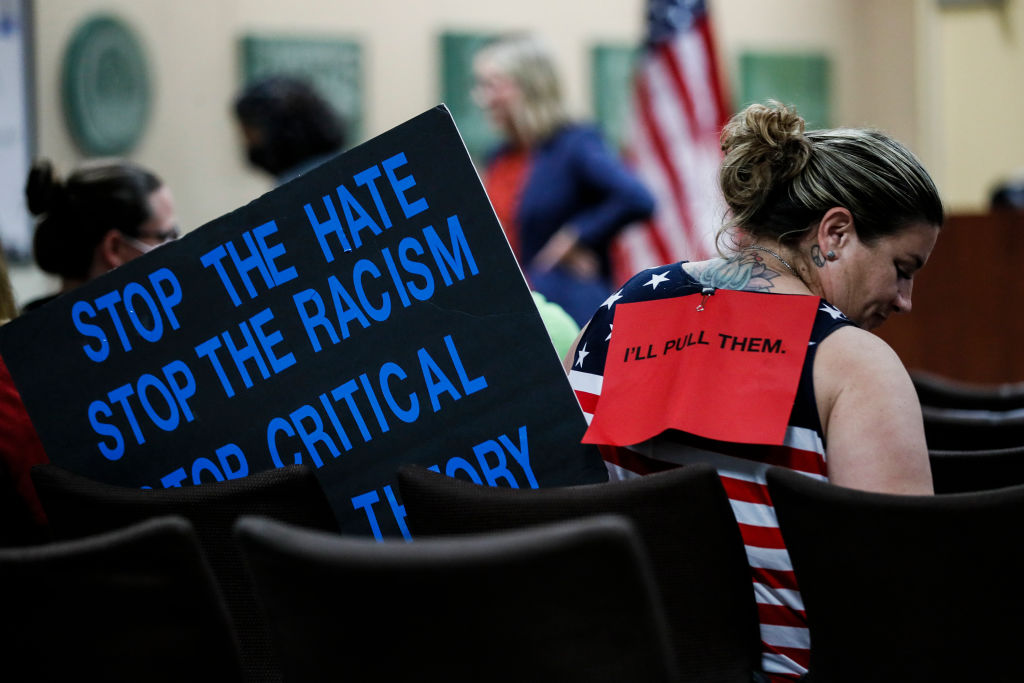California’s new graduation requirement has all the hallmarks of CRT.
A Christmas Gift Guide for the Discerning Dad

The best of the year in “show, don’t tell”
Every year, December arrives in a cloud of frost, obscuring temporal reality from husbands and fathers until those later dates, especially approaching the 25th, when it is generally expected that people offer something of value to their loved ones as a symbol of affection. While you could just as easily give any number of disposable widgets crafted by Chinese orphans in Shenzhen, satisfy the obligation, and leave the meaningful gift-giving to Wife or Mom, the past few years have presented a unique opportunity to bring once uninterested, perhaps apolitical, family members into the know on key points of interest.
No longer are you alone, Dad, in your interest in politics. But the prevailing winds blow against you. Your daughters, made deeply unhappy by hookup culture and careerism alike, have been instructed that their dissatisfaction neatly boils down to patriarchy. Your sons, made frustrated by their inability to accumulate wealth as their father once did, wonder if they should just give up. A glaring question emerges: how to bridge the gap between generations? If we are maximally charitable with regard to each perspective, we know that all sense something is wrong. So how can you help the others in your life see what Facebook-promoted political infographics will never tell them?
Here I have compiled the ultimate gift-giving guide for the discerning observer of current events trying to connect with loved ones who reach for explanation in all the state-sanctioned safe places and remain unsatisfied. None of the books listed are explicitly conservative or shock-jock in nature (sorry, Ann Coulter… I will always love you), so they should not repel the status-conscious self-proclaimed centrist. Still, all cut to the core of the civilizational crisis in their own way, and are bound to make the reader think twice about the status-quo narrative they’re probably already secretly questioning.
As a disclaimer, prudence must be remembered as you determine which of your friends and family members are actually open to alternative perspectives, as opposed to those who are too far gone. Some are indeed too far gone, a sad reality we must all face, and it is completely licit to protect oneself and conceal one’s power levels from such seedy characters. Commissars get coal.
BOOMERS: The Men and Women Who Promised Freedom and Delivered Disaster, Helen Andrews
Released in January of this year, Helen Andrews’ BOOMERS: The Men and Women Who Promised Freedom and Delivered Disaster is modeled after Lytton Strachey’s Eminent Victorians (1918). That is to say, the book is a cross-generational, and highly critical, review of the author’s parents’ peers. Andrews profiles Steve Jobs, Aaron Sorkin, Jeffrey Sachs, Camille Paglia, Al Sharpton, and Sonia Sotomayor in order to demonstrate the ways in which the self-anointed icons of the baby boomer generation upended centuries-old institutions and mores in order to satisfy delusional ambition at best, personal whim at worst, all to the detriment of those to follow.
This book is deeply insightful, wildly funny, and bound to appeal to young people, who will appreciate both its thoughtful analysis of boomer-created pop culture and the implicitly self-deprecatory act of receiving such a book from their parents.
Self-Care: A Novel, Julie Stein
This satire on Instagram influencer culture, female intrasexual competition, and startup grindset follows the lives of two women who have started an online community focused on “self-care.” One of them drinks too much, works too much, and manages the whole thing. The other is an elite golden-child heiress who spends all her time on hot yoga and personal development and is cripplingly anxious. Subplots include that the rich one is in love with a guy who will only have sex with her if she pretends to be asleep, and that the junior content editor at the startup uses wokeness to get one of the founders kicked out without a payoff.
No other book will appeal more readily to young people (especially women) in your life, all of whom, whether they participate directly or not, are subject to the soft tyranny of social media sex moguls and schoolmarms.
Irreversible Damage: The Transgender Craze Seducing Our Daughters, Abigail Shrier
Mary Eberstadt describes Shrier’s landmark volume on transgenderism as “bold, thorough, luminously argued, and compassionate. Based on almost 200 interviews and over four dozen families of adolescents, it is the indispensable work on the question of why ‘gender dysphoria’ has surged dramatically among adolescent girls during the last few years.” It is this compassion that make Shrier’s argument so compelling, because opposition to transgenderism has been falsely coded by leftwing media as an undeniable expression of hatred for “sexual minorities.”
Many people floating along unaware of the particularities of contemporary politics are genuinely troubled and vexed by the transgender issue. The default position for most of these “normies” is on one hand, they know that transgenderism is an offense against reason and nature. On the other hand, they feel they cannot make any judgments because according to all the prevailing propaganda, what another person chooses to do with their own body can never be of anyone else’s concern. Shrier drives a dagger through the heart of that argument by emphasizing the collapse of reasoned choice under the conditions of teen female social pressure, and demonstrating the real harm that the hormone industry enacts on its poor subjects. Shrier masterfully, as gently as possible, offers sufficient evidence for centrists to come off the fence on the most anti-reality, anti-human issue of the time.
Minor Indignities, Trevor Cribben Merrill
Published almost exactly a year ago by Wiseblood Books, Minor Indignities was my favorite of any book I read in 2021. In the novel, Merrill represents life on a degenerated college campus, the interplay of young egos and professorial egos, and the depressed sense of longing for something more true or wholesome or lovely. It all reminded me of Tom Wolfe’s I am Charlotte Simmons, this time with the narrative focus on the male perspective, and greater emphasis on the God-shaped hole in the heart of the modern campus. Evocative, and easily relatable to anyone who has spent any significant amount of time on campus since probably the nineties (at least).
The American Mind presents a range of perspectives. Views are writers’ own and do not necessarily represent those of The Claremont Institute.
The American Mind is a publication of the Claremont Institute, a non-profit 501(c)(3) organization, dedicated to restoring the principles of the American Founding to their rightful, preeminent authority in our national life. Interested in supporting our work? Gifts to the Claremont Institute are tax-deductible.
Harvard Law is preparing a cohort of election lawyers to fight for Democrat candidates.
An unholy alliance of planners, financiers, and leftists wants everyone to live in mass social housing developments.
President Biden’s Covid workplace mandate revives an ancient debate.
Iran’s nuclear threat is real, but the acute danger is digital.
On mothers and the mother of God.






